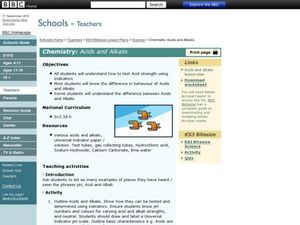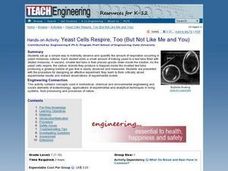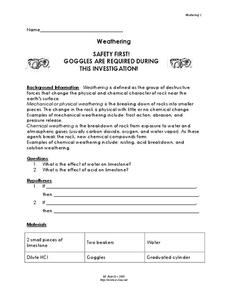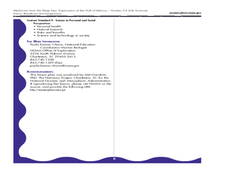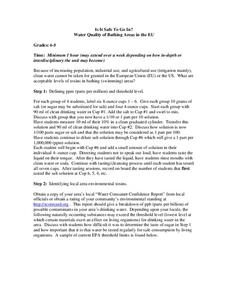Curated OER
Chemical Reactions
In this chemical reactions worksheet, students write chemical equations and calculate the moles of each product. This worksheet has 4 word problems.
Curated OER
The "Clock Reaction" Kinetics Lab
High schoolers investigate the effects of temperature and concentration on the rate of reactions. In this "clock reaction" kinetics lesson plan, students change the concentration of one reactant and keep the second constant. An indicator...
Curated OER
Volumetric Analysis 3-To Determine the Relative Molecular Mass of a Soluble Base
In this volumetric analysis worksheet, students determine the relative molecular mass of an unknown group 1 carbonate by experimenting with a known amount of hydrochloric acid. Students use volumetric analysis to determine the moles of...
Curated OER
Equilibrium Practice Problems
In this equilibrium worksheet, students answer thirty multiple choice problems including topics such as pH, analyzing titration curves, calculating molar concentrations and working with equilibrium constants.
Curated OER
Indicators For Acids and Bases
Fourth graders compare the color of cabbage water when acids and bases are mixed in. In this acids and bases lesson plan, 4th graders use cabbage water and mix in acids and bases that the teacher prepares before hand. They observe the...
Curated OER
Oxidation of Ethanol to Ethanoic Acid
In this oxidation reaction worksheet, students covert ethanol to ethanoic acid using a condenser. Students test the smell of the final product, they add sodium carbonate and they test the product with indicator paper. They explain their...
Curated OER
WS 10.10 Salts and Buffers
In this salts and buffers learning exercise, students answer five questions about the acids and bases that form salts as well as the equations for a buffer system.
Curated OER
Equilibrium and Acids & Bases
In this equilibrium, acids and bases worksheet, students answer 30 multiple choice questions about the formulas for acids and bases, the products of acid and base reactions, the concentration of ions in acids and bases and equilibrium....
Curated OER
Classifying Chemicals
In this acids and bases worksheet, high schoolers identify the strengths of acids and bases and indicate the concentration of hydronium and hydroxide ions. They determine if given chemical formulas are acids or bases,...
Curated OER
Chemistry: Acids and Alkalis
Students identify substances that are acids and alkalis. For this acids and alkalis lesson, students conduct tests to determine if given substances are acids or alkalis. They test substances and explain the different qualities that make...
Curated OER
Rate Laws Quiz
In this rate laws worksheet, students solve four problems. They determine rates of reactions, they determine which rate laws is used, they determine the overall reaction order and they identify the rate of appearance and disappearance of...
Curated OER
Transition Metal Ions and Redox
In this transition metal ions and redox worksheet, students read about the formation of metal ions through oxidation and reduction.
Curated OER
TE Activity: Yeast Cells Respire, Too (But Not Like Me and You)
Student observe and quantify the respiration that occurs in yeast-molasses cultures. They complete an effective experiment in order to examine how to think critically about the results.
Curated OER
Elements Compounds and Mixtures
In this science worksheet, learners apply science basic knowledge of chemistry to the puzzles that are listed for the four parts of the sheet while focusing upon the identification of a metalloid.
Curated OER
Kinetics Practice I key
In this kinetics worksheet, students solve six problems mostly about reaction rates. Included is a problem where students calculate reaction rates of sucrose and water and plot the data of the reaction.
Curated OER
What is a Chemical Reaction?-Evidence of Change
For this chemical reactions worksheet, students experiment with hydrochloric acid and copper (I) chloride to identify the types of reactions they undergo with various other substances. They also observe the law of conservation of mass...
Curated OER
Weathering
In this weathering worksheet, students investigate the effects of water and acid on limestone. They form a hypothesis for both and experiment to find the results.
Curated OER
Microfriends: Medicines from the Deep Sea
Students explore the concept of beneficial microorganisms. In this microorganisms activity, students observe different bacteria found in organisms Students discuss and describe three ways that microorganisms benefit humans.
Curated OER
Identifying Anions
In this anions worksheet, students are given a table showing 9 anions, the test that indicates the presence of each anion and what will be observed when each substance is added to the anion.
Curated OER
Food Forensics: A Case of Mistaken Identity
Learners develop an experiment to test a hypothesis. They use their knowledge of antigen-antibody specificity to develop a hypothesis. Students articulate that the antibody-antigen specificity is one part of the immune system. They...
Curated OER
Acid-Base Titrations without Burets
Learners analyze the level of acid and base in a titration. In this chemistry lesson, students investigate the amount of acid and base required to create certain household chemicals. They perform this activity without the use of burets.
Curated OER
Generate a Calibration Curve for Chlorophyll a
Students measure and graph the absorbance of light by chlorophyll at a specific wavelength versus chlorophyll concentration. They are given an unknown and determine its concentration from their calibration curve. Students become familiar...
Curated OER
Sensational Slime
Students predict, observe and draw conclusions while working on an experiment with "slime." Students accurately record observations and draw conclusions about the experiment.
Curated OER
Is It Safe To Go In? Water Quality of Bathing Areas in the EU
Students complete an experiment on water to study water quality. In this water quality instructional activity, students complete a taste test experiment about chemicals in water. Students then study their local water environments and...











